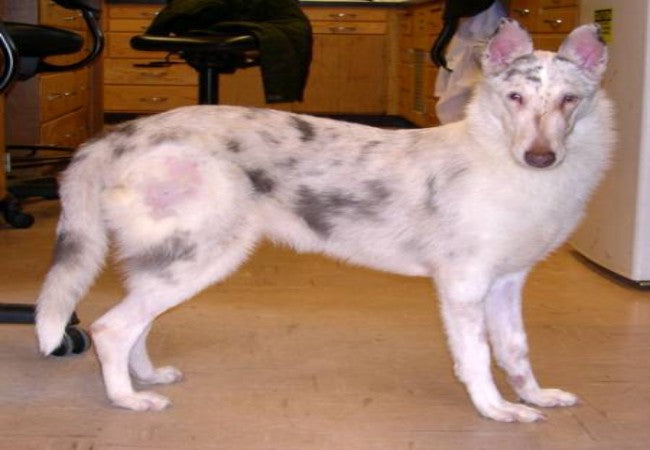Veterinary Guide to Cyclic Hematopoiesis (Gray Collie Syndrome) in Dogs (2025)🐶

In this article
Veterinary Guide to Cyclic Hematopoiesis (Gray Collie Syndrome) in Dogs (2025)🐶
By Dr. Duncan Houston BVSc
🔍 Introduction
Cyclic hematopoiesis, also called cyclic neutropenia or gray collie syndrome, is a rare autosomal recessive disease in Collies and related breeds. Puppies suffer from cyclic drops in neutrophils every 10–14 days, leading to recurrent infections, failure to thrive, and often early death. This 2025 guide covers causes, clinical signs, diagnostics, treatment (including gene therapy), prognosis, and breeding recommendations. 🩸
💡 What Is It?
- An inherited disorder caused by a mutation in the AP3B1 gene, leading to periodic drops in neutrophils and other blood cells.
- Puppies exhibit cyclic neutropenia (~200 neutrophils/µL) every 10–14 days, with intervening neutrophilia and reticulocytosis.
⚠️ Affected Breeds & Risk Factors
- Predominantly gray-collared Collies (rough & smooth), also reported in Border Collies, Pomeranians, Cocker Spaniels—always with color dilution phenotype.
- Autosomal recessive inheritance—affected puppies have two copies; carriers are asymptomatic but pass the gene.
🚨 Clinical Signs & Bloodwork
- Seen by 4–6 weeks: poor growth, conjunctivitis, gingivitis, diarrhea, pneumonia, skin infections, joint pain, fever.
- Cyclical signs: illness episodes during neutrophil nadirs and recovery during peaks.
- Secondary issues: anemia, thrombocytopenia, reactive reticulocytosis, bleeding events, amyloidosis.
🔬 Diagnosis
- CBCs collected over 10–14 days showed cyclic patterns in neutrophils and other lines.
- Notable traits: dilute gray coat, light nose.
- Genetic testing identifies carriers and affected dogs via AP3B1 mutation.
🛠 Treatment & Management
- Supportive care: antibiotics during neutropenic episodes, transfusions as needed.
- rhG-CSF therapy: recombinant human G-CSF stabilizes neutrophil counts, preventing cyclic nadirs.
- Gene therapy & bone marrow transplant: experimental successes in correcting neutropenia.
📈 Prognosis & Follow-Up
- Without treatment, puppies often die before 6 months; with therapy, lifespan may extend to 2–3 years, though chronic morbidities remain.
- Regular CBC monitoring, infection prevention, and antimicrobial support are essential.
🛡 Breeding & Prevention Advice
- Do not breed affected or carrier dogs; use DNA testing to confirm breeding candidates.
- Educate breeders on the dilution gene link to prevent propagation of the lethal mutation.
- Early testing in litters aids in prompt diagnosis and reduces suffering.
🔧 Tools & Support Services
- Ask A Vet App: 24/7 support for monitoring cycles, CBC interpretation, and guidance on treatments including G-CSF 📱
✅ Final Thoughts
Cyclic hematopoiesis is an inherited, often fatal condition in gray collie pups, but modern support, rhG-CSF, gene therapy, and bone marrow transplant provide therapeutic hope. Early diagnosis, lifelong monitoring, and prevention of at-risk breeding help protect future litters. With tools like Ask AVe, owners and vets can offer precise, compassionate care into 2025 and beyond. 🐾❤️
Download the Ask A Vet app today to track CBC cycles, manage infections, and plan advanced therapies. 📱💡






